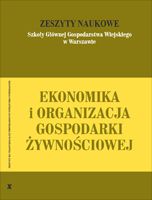Some Aspects of Comparative Analysis of Conventional and Ecological Farms in Respect to Cattle Feeding Economics and Organisation
Main Article Content
Abstract
The paper reports on the results of study based on a survey in a sample of 61 ecological and 53 conventional agricultural holdings. Comparative analysis of these farms with regard to economics and organisation of cattle breeding is refereed to 1997. The outcomes of the analysis show that cattle breeding processes in both selected types of farms are very similar, particularly when cattle feeding, reproduction, and adopted production technology are taken into consideration. Insignificant differences were noted in volume of milk and beef production but value of this output was higher in ecological holdings as a consequence of much higher prices for products of ecological farms origin. Generally, large ecological and conventional farms applied modern technologies of production. On the contrary, in small agricultural holdings there dominated extensive forms of production. Because of low incomes achieved by these households they used traditional, in complex methods of production. Difficulties with putting products on the market constituted the main problem which faced ecological agricultural holdings. These obstacles were caused by long distance of the market (large towns) and lack of well developed distributive network that limited consumers' access to healthy food.
Article Details
How to Cite
Siudek, T. (1998). Some Aspects of Comparative Analysis of Conventional and Ecological Farms in Respect to Cattle Feeding Economics and Organisation. Zeszyty Naukowe SGGW - Ekonomika I Organizacja Gospodarki Żywnościowej, (35), 147–165. https://doi.org/10.22630/EIOGZ.1998.35.47
Statistics
Downloads
Download data is not yet available.
Recommend Articles
Most read articles by the same author(s)
- Tomasz Siudek, Economic growth and the effectiveness of the selected co-operative banks in Poland – theoretical and practical aspects , Zeszyty Naukowe SGGW - Ekonomika i Organizacja Gospodarki Żywnościowej: No. 77 (2009)
- Tomasz Siudek, Katarzyna Drabarczyk, The efficiency of selected cooperative banks (for example of Masovian Voivodeship) , Zeszyty Naukowe SGGW - Ekonomika i Organizacja Gospodarki Żywnościowej: No. 110 (2015)
- Tomasz Siudek, Impact of Credits on Financial Results of Co-operative Banks in Poland , Zeszyty Naukowe SGGW - Ekonomika i Organizacja Gospodarki Żywnościowej: No. 47 (2002)
- Tomasz Siudek, The Bank Guarantee Fund's Role in Ensuring the Security and Stability of the Banking Sector in Poland , Zeszyty Naukowe SGGW - Ekonomika i Organizacja Gospodarki Żywnościowej: No. 55 (2005)
- Tomasz Siudek, Analysis of Preferential Credits Granted for the Agricultural Sector , Zeszyty Naukowe SGGW - Ekonomika i Organizacja Gospodarki Żywnościowej: No. 31 (1997)
- Tomasz Siudek, An Investigation of Regional Diversity in Economic and Financial Situation of the Cooperative Banks in Poland Using Taxonometric Analysis , Zeszyty Naukowe SGGW - Ekonomika i Organizacja Gospodarki Żywnościowej: No. 58 (2006)
- Tomasz Siudek, Katarzyna Drabarczyk, ECOLOGICAL DEVELOPMENT OF THE MAZOVIA COUNTIES , Zeszyty Naukowe SGGW - Ekonomika i Organizacja Gospodarki Żywnościowej: No. 120 (2017)
- Tomasz Siudek, Scope of Irregular Credits and Factors Determining Credit Risk in Co-operative Banks , Zeszyty Naukowe SGGW - Ekonomika i Organizacja Gospodarki Żywnościowej: No. 51 (2003)
- Tomasz Siudek, Impact of the level of development of agriculture on the value of given credits for agricultural holdings in Poland , Zeszyty Naukowe SGGW - Ekonomika i Organizacja Gospodarki Żywnościowej: No. 69 (2008)





